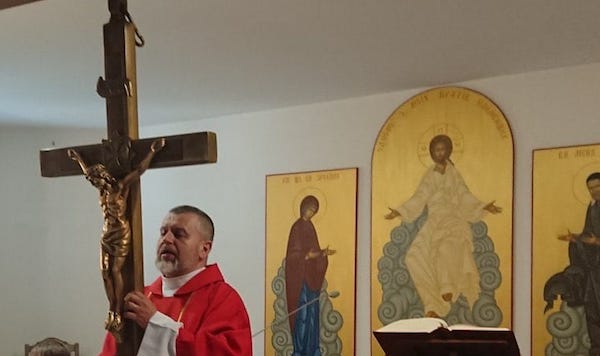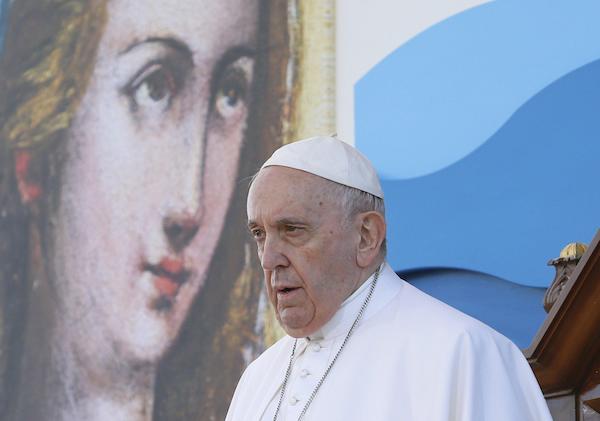In 2001, Cardinal Jorge Mario Bergoglio was drafted in at the last minute to take over the key role as moderator (relator general) of a Synod of Bishops gathering in the Vatican.
He replaced Cardinal Edwin Egan, who had flown back to the United States so he could be in New York in the wake of the 9/11 attacks on the Twin Towers. It was his experience at this meeting of bishops which convinced the future Pope Francis of the urgent need for the Church to deepen its understanding of what it means to become truly synodal, with free and open discussion and genuine openness to the Spirit.
While Francis has made decisive steps in this direction during his pontificate, an open letter signed by dozens of bishops warning that the German synodal pathway could lead to schism shows just how far things still have to go.
The dispute over the German process has now become a proxy war about the Francis papacy and the more synodal Church he is trying to create.
During that synod assembly in Rome more than two decades ago, Bergoglio’s job was to “gather the material” and “arrange it”. But – as Francis told a group of Jesuits in Malta earlier this month – the then secretary-general of the synod office, Cardinal Jan Pieter Schotte, would “remove this or that thing, which had been approved by a vote of the various groups”.
“There were things he did not consider appropriate. There was, in short, a pre-selection of materials.”
Schotte’s approach showed “a failure to understand what a synod is,” Francis told his fellow Jesuits. “Today, we have moved forward and there is no going back.” He’s right. The synods of bishops since Francis became pope nine years ago have seen a freer exchange of views, a greater focus on listening and a much less stage-managed process.
The Pope’s remarks in Malta were published in La Civiltà Cattolica three days after the release of the letter accusing the German synod of taking the wrong path. The bishops – currently 92 of them – say that the German “focus on ‘power’ ” in the Church “suggests a spirit fundamentally at odds with the real nature of Christian life”.
Yet isn’t this another way of saying that there are some things that can be discussed, and some things that can’t? The mentality of insisting on a “pre-selection of materials”, which the Pope remembered happening in 2001, still runs deep. Furthermore, there appears to be a lack of faith in the synod discernment process by trying to intervene before it has even concluded. Do the bishops not trust the Pope to ensure that the German synod walks with the rest of the Church?
So far, signatories include Cardinals Raymond Burke, George Pell and Francis Arinze, all of them prominent conservatives with Burke a leading critic of Francis. They also include two bishops from Scotland (Archbishop Leo Cushley and Bishop Stephen Robson) and one from England and Wales (Bishop Mark Davies). A surprise name is Ghanaian Archbishop Charles Palmer-Buckle, who at the 2015 synod spoke in favour of giving communion to divorced and remarried Catholics.
This is not the only letter of protest against the German synodal path, with the President of the Polish Bishops Conference and the Nordic bishops writing letters to Germany to express their concerns.
The aim of these initiatives is to put public pressure on the German bishops and the Pope to curtail or shut down the synod process. The latest letter also includes a veiled threat that Germany’s example “may lead some bishops, and will lead many otherwise faithful laypeople, to distrust the very idea of ‘synodality’”. In other words: if Germany doesn’t change its ways then expect resistance to the whole synod process.
Yet the topics under examination by the German synod – the use of power, the role of women in the Church, the ordained priesthood and Catholic sexual teaching – are all topics that are being raised in local churches as part of the global synod. They can no longer be ignored, particularly in light of the clerical sexual abuse crisis.
In response to the criticisms, Bishop Georg Bätzing, the President of the German Bishops’ Conference, has stressed the underlying causes of the abuses scandals, including the abuse of power, must be faced. The crisis cannot simply be “spiritualised” as evil acts committed by an individual while the structures, culture and habits that did not adequately handle abuse are left untouched.
There are plenty of criticisms that might be made of the German synodal pathway, with Francis himself urging German Catholics in a 2019 letter not to “go it alone”. The letter from the bishops, however, reveals a reluctance, and a fear, about embarking on the journey to becoming a synodal Church.



 Loading ...
Loading ...